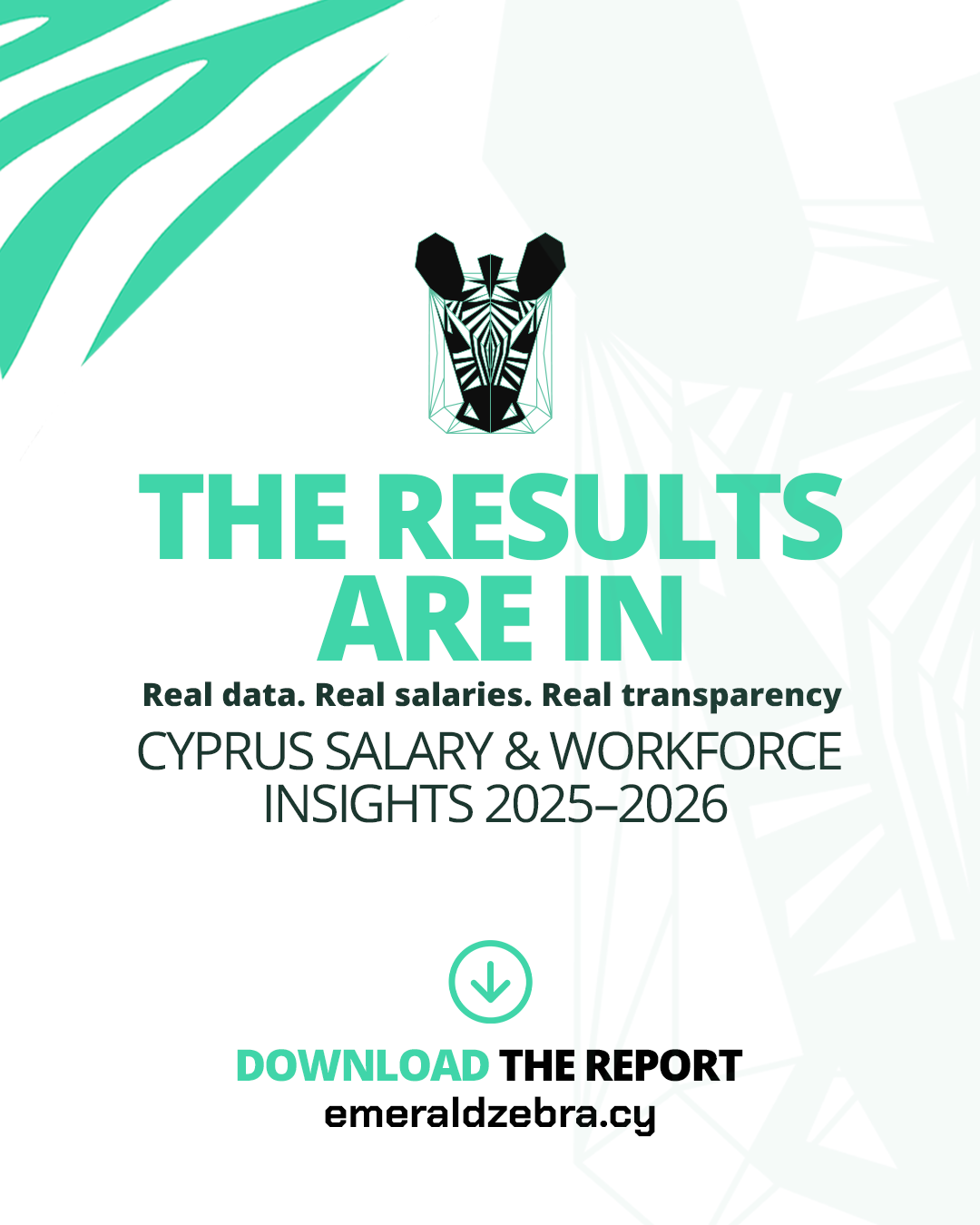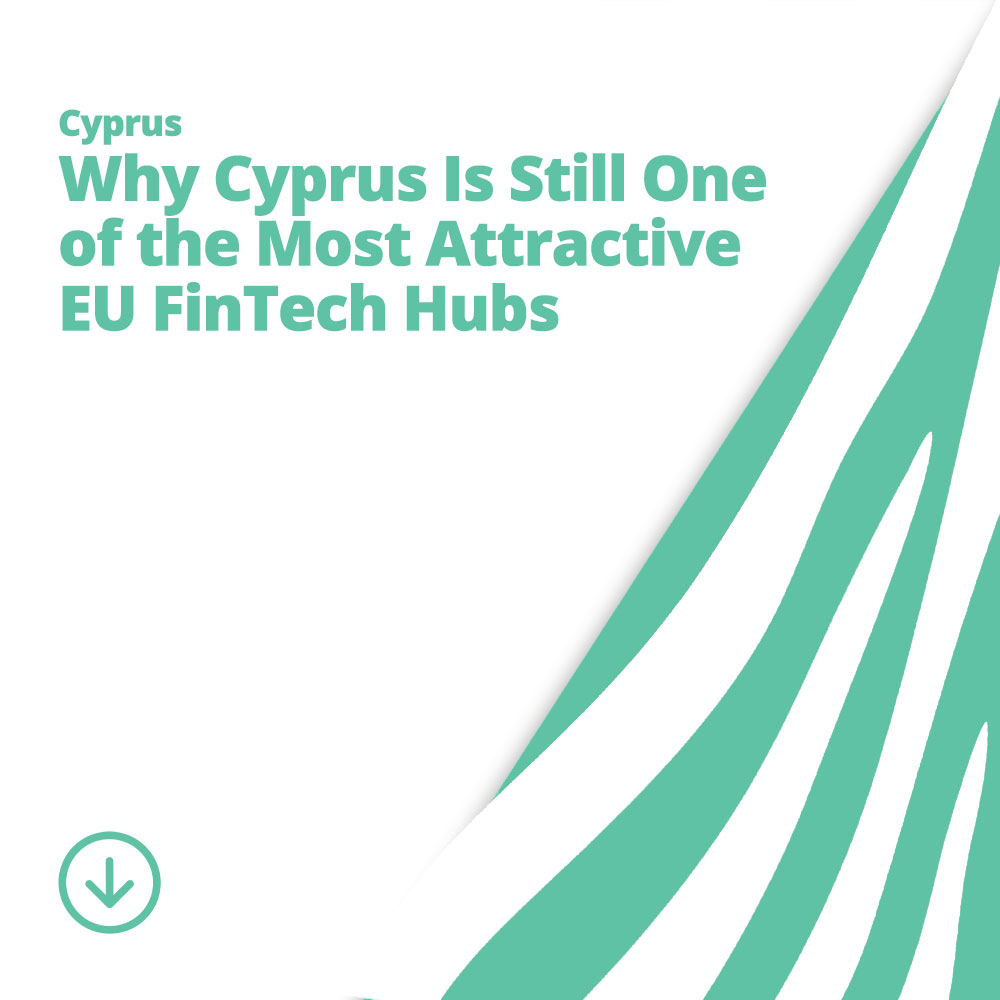Why Cyprus Is Still One of the Most Attractive EU FinTech Hubs and What Could Break That Advantage
Cyprus, with its thriving tech and fintech sectors, has become a hotspot for startups and innovative companies. In fact, the island is home to a growing tech hub (employing over 10,000+ IT professionals) and has attracted hundreds of international firms in recent years. In this competitive sector, offering early equity (a stake in the company) is a great tool for attracting and retaining the right talent. This guide explains what equity compensation is, how vesting schedules and cliff periods work, and why they matter for both employers and candidates in Cyprus’s startup ecosystem.
What Is Equity Compensation?
Equity compensation means giving employees an ownership stake in the company, typically through shares or stock options, as part of their reward for working there. Instead of (or in addition to) a salary, the employee receives the right to own a portion of the company’s stock. Common forms include stock options (the right to buy shares at a set price) and restricted stock units (RSUs), but all serve a similar purpose: to make employees co-owners of the business.
This practice has become increasingly popular among startups worldwide, one recent survey found 76% of companies offer some form of equity compensation, up from 65% just a few years prior. Startups use equity as a strategic lever because it offers unique benefits that traditional pay alone cannot. By granting early team members a slice of the company’s future success, a startup can conserve cash while still offering compelling total compensation. More importantly, equity compensation inherently aligns the interests of employees with those of founders and investors: if the company thrives, everyone’s share becomes more valuable. We’ll explore these benefits in detail below.
Why Do Startups Offer Equity? (Benefits for Employers)
Early-stage companies in Cyprus and globally often operate with tight budgets, yet they need top talent to build their products and businesses. Offering equity helps startups punch above their weight in the talent market. Here are key reasons employers use equity in compensation:
- Attract and Retain Talent: Equity is a magnet for ambitious professionals. It allows startups to attract top talent without immediate financial strain on payroll, and to keep employees around longer because they have skin in the game. Knowing they stand to profit if the company succeeds, employees are less likely to jump ship. In fact, 95% of HR leaders in one study agreed that equity compensation is one of the most effective ways to keep employees motivated and engaged.
- Align Interests (“Owner’s Mindset”): By becoming shareholders, employees share the same goals and incentives as the founders and investors. This alignment means everyone is working toward the company’s success and value growth. Employees with equity develop an owner’s mindset – they think about the long-term mission, not just short-term paychecks. As one Cyprus legal expert notes, ESOPs (Employee Stock Option Plans) “bring into line the interests of the employees with those of the company… making them partial owners who benefit directly from the company’s success”.
- Conserve Cash for Growth: Instead of spending large sums on salaries, startups can offer slightly lower salaries combined with equity. This helps improve cash flow and frees up resources to invest in growth. Equity thus serves as an alternative reward that doesn’t immediately impact the company’s finances, which is crucial for early-stage companies that are often pre-profit.
- Build Loyalty and Performance: An equity stake can foster a deep sense of loyalty. Employees know they’re working for themselves in a way, since their earnings are linked to company performance. This can translate into higher productivity and commitment. One infographic on vesting explains that “pride in ownership” from equity motivates employees to maximize their contribution, because they directly share in the company’s success. In short, equity can turn team members into true believers in the mission.
Of course, offering equity isn’t a magic bullet. Companies must ensure the equity on offer has potential value (through a solid business plan) and they must educate employees on the risks, if the startup fails or its value declines or becomes diluted, the equity could ultimately be worthless. Nonetheless, when used thoughtfully, early equity grants are a win-win: they help startups secure the right talent who are committed to the mission, and give those employees a chance to share in the rewards of success.
Vesting Schedules: Earning Equity Over Time
When a company grants equity to an employee, it usually doesn’t hand it over all at once. Instead, equity awards come with a vesting schedule, a timetable over which the employee earns ownership of their shares or stock options. Vesting is a crucial concept for both employers and employees to understand, as it protects both parties and incentivizes long-term commitment.
Under a typical time-based vesting schedule, an employee’s equity will vest gradually over a few years. A very common structure (especially in tech startups) is a four-year vesting schedule with a one-year cliff. Here’s how that works in practice:
- Vesting Period: Say an employee is granted stock options equivalent to 2% of the company, vesting over 4 years. The vesting period is four years, meaning the employee must stay for four years to earn the full 2%. This period and terms are usually set out in the employment contract or stock option agreement.
- One-Year Cliff: The cliff is a special initial period (often 12 months) before any vesting happens. During the first year in this example, nothing vests the employee accrues 0% ownership in year one. At the one-year mark (the “cliff date”), if the employee is still with the company, a chunk of equity vests all at once. Typically, 25% vests at the one-year cliff, reflecting one of four years completed. In other words, when the cliff is reached, the employee “catches up” and becomes 25% vested in their stock.
- Monthly or Quarterly Vesting Afterward: After the cliff, vesting usually happens in regular intervals (e.g. monthly or quarterly) for the remaining period. In our 4-year plan example, after the first year’s 25%, the remaining 75% will vest in equal installments over the next 36 months (if monthly vesting) or 12 quarters (if quarterly vesting). This works out to roughly 1/48th of the total grant each month after the first year, until the employee is 100% vested at the four-year mark. At that point, the employee fully owns all the equity promised (2% in this case).
This kind of vesting schedule is so standard in startups that it’s almost taken for granted. “Plans often have a four-year vesting schedule with a one-year cliff,” Investopedia. The purpose is clear: it rewards loyalty and performance over time, and ensures that people who leave very early don’t walk away with ownership. If an employee departs before the one-year cliff, they typically forfeit all equity (since 0% had vested). After the cliff, if they leave in, say, year 3, they might keep whatever had vested (perhaps ~50% in that scenario) and forfeit the rest. Vesting schedules thus protect the company while still giving the employee meaningful stakes as they contribute over the years.
Performance-based and Hybrid Vesting: While time-based vesting is most common, some startups also use performance or milestone-based vesting criteria. For example, an employee might vest a portion of shares only when a project is completed or when the company hits a milestone (such as an IPO or specific revenue target). Often, startups implement a hybrid vesting approach – requiring both a time commitment and achievement of certain milestones. However, even in these cases, the overall philosophy remains the same: employees earn equity by contributing to the company’s success over a period. The focus of this article is the time-based vesting with cliffs, since it’s the model most early-stage hires will encounter.
The One-Year Cliff: What It Is and Why It Matters
A vesting cliff is the initial period before any equity vests, commonly set to 12 months. In simple terms, the cliff is like a probation period for equity. Until the cliff date is reached, the employee has no vested ownership. At the cliff, a large first block of equity vests (usually the first year’s portion), and after that the regular vesting rhythm begins.
Why have a cliff? For employers, the cliff serves two important purposes: filtering and protection. First, it filters for commitment, it ensures that the company’s equity is going only to those who stay at least a minimum amount of time. If someone leaves after a few months, they leave with nothing; only those who stay a full year start to get a piece of the company. This helps build a team of people who are truly invested in the mission. As one startup guide puts it, “Employees, knowing they must commit to at least a year, are more likely to immerse themselves in the company’s mission, creating a sense of belonging and purpose.”says, Donna Stephenson, Founder Emerald Zebra Recruitment Agency. In other words, the one-year cliff sets a tone of mutual commitment right from the start.
Second, the cliff protects the company from giving away equity to short-term hires. Early-stage startups often cannot afford to lose equity to someone who came aboard for a brief stint without significant contribution. The cliff period makes sure no compensation is given before a certain date, and so no major losses of capital if they leave the company early. It essentially prevents the scenario of an employee owning, say, 1% of the company after working only a couple of months. Only when an employee proves their commitment by staying a full year do they earn that first 25%. This policy is cost-effective for startups, it saves equity (and avoids the administrative overhead of issuing shares) for those who stick around.
From the employee’s perspective, a one-year cliff might feel like a waiting period, but it’s a standard practice and not a sign of distrust, it’s about aligning with startup norms. Once you hit your first anniversary and that chunk vests, it’s a milestone affirming that you’re a valued part of the team. (One thing to be aware of: if an employee is let go or the company fails before the cliff, they won’t see any equity benefit, that’s the flip side risk of cliffs for employees. However, many view it as a fair tradeoff for the upside potential.)
In summary, the one-year cliff is a trial period for equity. It helps ensure that equity truly fulfills its purpose as a long-term incentive for committed team members. Practically every startup in tech/fintech uses a cliff as part of their vesting plan (1-year is standard, though occasionally a shorter cliff might be used for certain roles or a longer one for co-founders). It sets the foundation for a healthy founder-employee relationship grounded in commitment to the company’s mission.
Who Should Get Equity in a Startup?
Equity isn’t given to every employee in every company, it’s typically reserved for those who will drive growth and whose long-term commitment is crucial. In Cyprus’s startup scene, as globally, offering equity is a sign that an employer highly values a team member’s contribution and wants to create a partnership mindset. Here’s a look at who usually gets equity grants (and why):
- Founders and Co-Founders: By definition, founders start with ownership stakes. Importantly, many startups even put founders on vesting schedules (often termed “reverse vesting”) to reassure investors and each other that no founder will quit early with a large chunk of stock. This ensures founders are locked into the mission for the critical first years. (While founders already “have” equity, subjecting it to vesting is about commitment, not about awarding it anew.)
- Key Early Employees: These are the first hires in engineering, product, sales, etc., who join when the company is just an idea or a very young operation. They often take a risk by joining a nascent venture, possibly at below-market pay, so startups reward that risk with significant equity packages. Early employees might get grants that equate to a meaningful percentage (e.g. 0.5%, 1%, 2% depending on role and stage) because their impact on shaping the company is outsized. The equity is an incentive for them to help build the company from the ground up and stay for the journey.
- Senior Executives & Critical Hires: To lure experienced leaders (like a CTO, VP of Sales, etc.) from comfortable jobs, startups will offer equity grants. Founders and key executives typically receive larger equity grants due to their critical roles. For example, a CEO brought in to scale the company might get a substantial option grant. These leaders’ decisions greatly influence company success, so giving them equity aligns their high-level strategic efforts with shareholder value growth.
- All Full-Time Team Members (in Many Startups): It’s increasingly common, especially in tech companies, for every full-time employee to receive some stock options or RSUs. Startups that embrace broad-based equity do so to instill an ownership culture at all levels. Engineers, designers, marketing staff, etc., who join beyond the very early stage may still get smaller equity grants as part of their offer. While the percentages for later hires dilute over time, the gesture is important. It tells employees that “we’re all in this together”. From the business side, granting equity even to junior team members can boost morale and productivity, as people feel they are partners in the venture’s success. In Cyprus, high-growth companies and international firms relocating here should, ideally be introducing such practices to remain competitive with global tech employers.
- Part-Time Employees and Contractors: Generally, short-term contractors or part-time staff are less likely to receive equity or may receive a token amount. Equity is fundamentally a long-term incentive, so it’s reserved for those with a long-term relationship to the company. However, there are cases where a part-time specialist or a key contractor might get a small grant or bonus tied to milestones. For example, if a contractor delivers a crucial project, the company might reward them with a one-time equity grant that vests upon project completion (a form of milestone vesting). These are handled on a case-by-case basis and often structured carefully to avoid the person becoming a legal shareholder if that’s not intended.
- Advisors and Board Members: Startups frequently engage industry advisors or mentors, experienced individuals who aren’t employees but provide valuable guidance, contacts, or credibility. Instead of cash, advisors are often compensated with small equity stakes (for instance, 0.1%–0.25% of the company). Advisor equity typically vests over a shorter period (commonly 1–2 years) without a cliff, since advisors might be involved on a limited timeline. This arrangement gives advisors incentive to stay involved and adds up to meaningful equity only if the company does well (which is when their advice presumably helped). It’s worth noting that Cyprus companies can and do use advisor equity grants, especially in sectors like fintech where specialized expertise is critical.
For employers, deciding who gets how much equity is a strategic question. It should be guided by the impact and long-term importance of each role. As a founder, you want to offer enough equity to be motivating and fair (relative to market standards), but not so much that you cannot hire future employees or investors due to running out of equity (“equity overhang” is a risk if you give away too much early). Many startups create an “employee option pool” specifically to grant stock to employees over several years. This needs to be managed wisely consider seeking legal advice on setting up an option plan (ESOP) that fits your company’s structure and growth plans.
From the employee/candidate perspective, if you are joining a startup, you should expect a formal equity offer only if you are a full-time employee (or founder). If you’re an early hire or a senior hire, equity will likely be a significant part of your compensation package. Make sure to ask about the vesting schedule and cliff so you understand when and how you actually earn that equity. If a startup in Cyprus or elsewhere doesn’t mention equity and you are coming in as an early key employee, it’s reasonable to bring it up in negotiations, given how widespread the practice is in tech startups today.
Equity in Cyprus’s Startup Scene: Local Considerations
Equity-based compensation is a relatively newer concept in Cyprus compared to more mature startup hubs, but it’s quickly gaining ground. With so many tech and fintech companies launching or relocating to Cyprus (the use of ESOPs in these industries is already increasing), local startups are adopting global best practices to compete for talent. Both employers and candidates should keep a few local considerations in mind:
- Legal Framework: Cyprus has no specific law prohibiting or regulating employee equity schemes like ESOPs or share-option plans. This gives companies flexibility in designing stock option plans, as long as they comply with general company law and tax law. Notably, Cyprus law limits private companies to 50 shareholders, but employees who become shareholders via an ESOP are excluded from that 50-shareholder count. In practice, this means a startup can grant shares or options to many employees without losing its private company status, a useful provision for startups planning broad employee ownership. Setting up an ESOP will involve drafting agreements and perhaps altering the Articles of the company; many Cypriot law firms offer services to help with this process, ensuring compliance with Companies Law (Cap. 113) and other regulations.
- Tax Implications: Both employers and employees should be aware of how equity compensation is taxed in Cyprus. Stock options or RSUs given to an employee are generally treated as a benefit in kind, with taxable income arising when the option is exercised or when any restrictions on the stock are lifted. In plain terms, if you’re an employee who receives options, you won’t owe income tax at the grant date or during vesting; you’ll typically be taxed at the moment you exercise those options (i.e. when you buy the shares, usually at a profit) or when they vest into unrestricted shares. The taxable amount is the difference between what you paid and the market value of the shares. There are some favorable nuances – for instance, if the company is not publicly listed, a fair valuation method is used to determine the share value, and any dividends you earn as a shareholder may be tax-exempt for non-domiciled residents (a common status for expats in Cyprus). The key takeaway is that professional tax advice is crucial. Both companies and candidates should consult a tax advisor to understand obligations (e.g. withholding and reporting for the company, and personal tax for the employee) before finalizing an equity compensation plan.
- Competitive Global Talent Market: Cyprus’s workforce and startup community are increasingly international. Many professionals here work remotely for foreign companies, and conversely many Cyprus-based startups hire talent abroad. This global context means local candidates compare offers not just with other Cypriot firms but with opportunities in London, Berlin, Silicon Valley, etc. Equity offerings help Cyprus startups remain competitivein this global talent pool. If you’re an employer in Cyprus, offering a well-structured equity package (on par with what candidates might get elsewhere) can be a decisive factor in recruiting or retaining that star engineer or product manager who has remote opportunities. As evidence of the global mobility: in recent years, numerous startup founders and tech professionals have relocated to Cyprus for its favorable tax regime and lifestyle, working for companies around the world. This interconnection raises the bar for local companies to match global standards in compensation, including equity. The good news is that with the right setup, equity plans “travel well”, you can grant equity to employees in Cyprus or abroad, though you must mind each country’s laws. Using modern tools and possibly Employer of Record services can help manage cross-border equity compliance, but that’s a deeper topic. The bottom line: don’t shy away from offering equity because you’re in Cyprus, it’s very much part of the playbook here now, especially in tech and fintech circles.
- Cultural Shift and Education: Since equity compensation is still an emerging practice in Cyprus, employers might need to invest in educating their teams about how it works. Candidates who have only worked in traditional industries might not immediately grasp stock options, strike prices, vesting, etc. It’s wise to clearly communicate the terms: How many shares or options? What percentage of the company could that represent? What is the vesting schedule and cliff? What happens if the employee leaves or if the company exits? Being transparent and ready to answer these questions will build trust. Likewise, candidates should feel empowered to ask these questions. A well-informed employee will appreciate the value of their equity (and its risks) better, leading to the desired effect of increased engagement. Clear communication is key to making equity a successful part of your compensation strategy.
“If the venture succeeds, the financial and personal rewards can be substantial, and even if not, being part of a company’s journey as an “owner” provides invaluable experience.”
When done correctly, early equity grants create a bond of trust “we’re in this together for the long haul,”and the employee thinks “I believe in this mission enough to invest my future in it.” That mutual commitment, fueled by the promise of shared success, is often the secret sauce that propels startups to new heights and aids retention of skilled employees.
Food For Thought
Equity can be a golden ticket, just make sure you earn it (or grant it) the right way: through dedication, over time, and in alignment with a bold vision. This bodes well for all who value innovation, ownership, and a commitment to shared success.
Donna Stephenson is the Founder and CEO of Emerald Zebra, a specialist recruitment agency in Cyprus focused on the FinTech, Tech, Finance and iGaming sectors. With 25 years’ experience, she previously founded GRS Recruitment, which she led to become Cyprus’s leading recruitment agency before successfully exiting the business. She has a proven track record in building and growing recruitment businesses from the ground up, with deep expertise in executive search, market entry hiring, and supporting fast-scaling companies through tailored talent strategies.
A strong advocate for pay transparency and modern workplace practices, Donna also founded HR PowerBreakfast, a thought-leadership series for Cyprus’s HR and executive community. She has spoken at numerous industry events, including TEDxMolos Women 2024, sharing insights on leadership, trust, and aligning work with purpose.
Related Guides & Resources
Hiring FinTech Talen in Cyprus
Hiring Forex/CFD Talent in Cyprus
Hiring Finance Talent in Cyprus
Hiring Crypto/Digital Asset Talent in Cyprus
Hiring iGaming Talent in Cyprus
Cyprus Salary Guides – By Job Role



